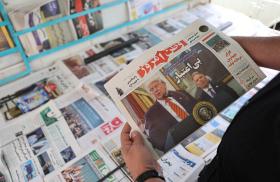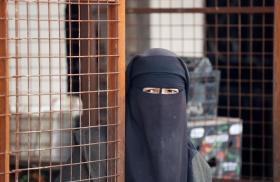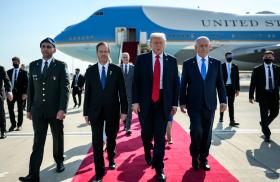
- Policy Analysis
- PolicyWatch 4086
If Iraq Passes the New PMF Law, the U.S. Response Should Be Severe

Permanently enshrining Iran-backed terrorist groups inside the Iraqi state would be a massive blow to U.S. interests, so Washington’s reaction should be clear, proportionately harsh, and coordinated with other regional partners who have likewise been victimized by these groups.
Despite the blows suffered by its regional proxies since 2023, Iran is hardly abandoning its foreign militia strategy—in fact, it is doubling down on its main proxy in Iraq, the Popular Mobilization Forces (al-Hashd al-Shabi). In late July, the various Iran-backed “resistance” brigades in the PMF and their aligned parties in parliament advanced legislation aimed at further institutionalizing their military and political presence in Baghdad. The initiative threatens to undermine Washington’s already tenuous relations with Baghdad.
Outliving Their Mission
The militias that make up the PMF were originally established in 2014 after the Islamic State captured large swaths of Iraqi territory. With IS on the march, Iraq’s leading Shia cleric, Grand Ayatollah Ali al-Sistani, issued a fatwa calling on Iraqi citizens to fight the Sunni terrorist organization. Thousands answered the call and fought alongside the Iraqi army and the U.S.-led coalition.
Although Baghdad declared victory over IS in December 2017, nearly eight years ago, the Hashd remain larger and stronger than ever. Today, the PMF boasts 238,000 fighters with an annual government budget of $3.6 billion. Its forces encompass over seventy factions, including a handful of U.S.-designated terrorist groups, most notably Harakat Hezbollah al-Nujaba, Asaib Ahl al-Haq, and Kataib Hezbollah. Despite being funded by the Iraqi state, these terrorist PMF factions are loyal to Iran and remain intently dedicated to expelling U.S. troops from Iraq.
New PMF Law
On July 16, parliament conducted its final reading of the draft PMF Law, so it can now bring the bill to a vote at any future session. If passed, the legislation would enshrine the original single-page 2016 law that established the PMF as a temporary commission by the prime minister, upgrading the organization to a permanent arm of the state. It would also formalize the PMF’s structure, detailing its positions, responsibilities, benefits, and bureaucratic chains of command. In addition, the law would provide for the establishment of a separate military academy for the Hashd. And perhaps most controversially, it would elevate the PMF commander—currently Faleh al-Fayyad, designated by the U.S. Treasury Department in 2021 for gross human rights abuses—to the rank of minister and place him on the Ministerial Committee for National Security.
After the draft law had its first reading in January, opponents of the legislation—including some Kurdish parties and the Sunni Arab Taqaddum bloc—sought to prevent a second reading by boycotting parliamentary sessions to prevent a quorum. On July 16, however, the law was apparently added to the agenda after that day’s session began, when a quorum had already been established. According to parliamentary procedure, bills that have undergone a second reading are set for a vote.
Although many have long hoped that Baghdad would take steps to integrate the Hashd into the regular armed forces, the new law promises to legitimize the organization as an independent, parallel military structure. In theory, this would make the PMF even more formally and legally answerable to the prime minister, much like the Ministries of Defense and Interior. In practice, however, the PMF leadership and “resistance” factions have been following Tehran’s lead—and targeting Americans and Iraqis—since at least 2019,when the first Trump administration implemented its sanctions campaign against Iran. No one can credibly expect that approach to change if a new law strengthens their influence and institutional fortitude.
Moreover, while the draft law mandates that the PMF maintain an apolitical orientation, the organization’s Shia leadership and terrorist factions are deeply sectarian and ideological and make no secret of their inclination toward the Iranian regime. Indeed, the legislation itself refers to PMF members not as “soldiers” or “military personnel” but as “mujahedin” (holy warriors).
Differences with Washington
In a July 22 call with Prime Minister Mohammed Shia al-Sudani, Secretary of State Marco Rubio expressed concern that the draft PMF Law would “institutionalize Iranian influence and armed terrorist groups undermining Iraq’s sovereignty.” Rubio is the latest in a series of senior U.S. officials spanning multiple administrations to press Baghdad about exerting control over the PMF.
One of the many ways Hashd members have contravened Iraqi government policy and orders is by repeatedly attacking the U.S. presence, including the embassy in Baghdad and American forces in the counter-IS coalition. They have also launched drones into Israel.
PMF factions also have a predilection for targeting Iraqis. They have attempted to assassinate politicians (including a former prime minister and speaker of parliament), killed journalists, assaulted peaceful protesters, threatened minorities (e.g., Christian communities in Nineveh), and used drones to attack energy infrastructure in the Kurdish Regional Government. Just this past week, Kataib Hezbollah militiamen attacked a Ministry of Agriculture facility while attempting to prevent the removal of a sympathetic senior official who had helped them acquire lucrative interests in major farming areas, killing a police officer and civilian in the process.
Prime Minister Sudani has a different view of the pending legislation—hardly surprising given that he presides over a fractious government led by the Iran-backed Coordination Framework, which is essentially the political arm of the PMF. According to him, the bill is a necessary step in “the security reform process.” In a recent interview with the Associated Press, he suggested that the new law would somehow compel the Hashd to abide by Iraqi law and be “accountable” to the state.
There is no such optimism in Washington. Hashd members have rarely been held accountable for their crimes against Iraqis or attacks on U.S. military and diplomatic personnel, and nothing in the draft law indicates this will change. Indeed, the prevalent U.S. view is that the PMF increasingly resembles Iran’s Islamic Revolutionary Guard Corps. Like the IRGC, the PMF receives funding and support from the state yet operates independently of state authority, instead relying on guidance from the Iranian regime while acting with impunity at home and abroad.
Policy Options
Baghdad’s support for the PMF’s institutionalization will complicate continued U.S. military cooperation and undermine the already weak prospects for additional American economic investment in Iraq. Washington has essentially warned Baghdad that this legislation, if passed, may have consequences. The pro-Hezbollah Lebanese daily al-Akhbar even reported that the U.S. chargé in Baghdad, Steven Fagin, recently threatened Sudani with “decisive international intervention” if his government continues to arm the militias. Absent further militia attacks on Americans, it is difficult—but not impossible—to imagine the Trump administration targeting the Hashd militarily. Yet Washington has other options to signal its disapproval of Iraq’s accelerating slide toward state-sponsored terrorism:
- Expedite the withdrawal of U.S. troops. The United States currently has about 2,500 troops stationed in Iraq as part of the counter-IS coalition. By agreement, hundreds of these troops are supposed to withdraw by this September, and the remainder by the end of 2026, followed by a transition to a smaller, bilateral presence. Meanwhile, PMF factions have threatened to resume targeting U.S. forces if they are not gone by the end of next month. Given the Sudani government’s unabashed political and financial support for groups with a track record of attacking Americans, now might be the time to let Iraq defend itself by itself.
- Release intelligence on the Kurdistan strikes. The current Iraqi government, which counts PMF-aligned politicians among its coalition partners, has been tasked with investigating the militias’ role in the recent drone attacks on the Kurdistan Region—an obvious conflict of interest. If Washington has intelligence confirming PMF involvement in these strikes, it should release it and shame Baghdad into holding these militias accountable.
- Don’t invite Sudani to Washington. It is widely known that the prime minister wants to visit the United States soon to secure the appearance of America’s blessing before Iraq’s November parliamentary election. Allowing him to do so would be ill-advised. Iraqi prime ministers are not normally hosted in Washington during their reelection campaigns—let alone a premier whose main coalition supporters are Iran-backed militias who kill Americans.
- Issue a State Department warning on commercial ventures. Sudani recently stated that he is seeking increased U.S. investment in Iraq’s energy sector in order to make “the two countries great together.” For a host of reasons—principally the difficulty of doing business in Iraq—U.S. companies have largely chosen not to bid on contracts there, even in the potentially lucrative energy sector. If the government strengthens its embrace of terrorist organizations, the State Department may want to issue an alert warning companies to exercise extreme caution when considering ventures in Iraq, similar to what it did with Venezuela. The PMF’s own corporate entity, the Muhandis General Company, is increasingly involved across the Iraqi economy, so it may be difficult for American corporations to avoid inadvertently violating sanctions if they do business there.
- Hold political parties accountable. The mercurial Shia leader Muqtada al-Sadr appears to oppose the Hashd law, but he will not have a say if it comes to a vote, since he resigned his bloc from parliament in 2022. But the Kurdish parties will have a say. Unfortunately, some of them have voted for egregious legislation in the past (e.g., lowering the marriage age to nine) in exchange for Hashd political support on other issues. Washington’s disposition toward Kurdish parties and other political factions should reflect how they vote on the PMF Law.
- Internationalize the response. Presumably, Washington is not the only capital irritated by the Iraqi government’s validation of Iran-backed militias. Among other offenses abroad, the Hashd have attacked targets in Kuwait and Saudi Arabia, violated Syria’s sovereignty, and threatened Jordan. Sudani is hoping to improve ties and receive investment from Arab states, but allowing the PMF Law to pass could undermine these regional integration efforts.
- Formally designate Iraq as a State Sponsor of Terrorism. This is the nuclear option and would likely be counterproductive, driving Iraq further into the arms of Iran, so hopefully it will not prove necessary. In the meantime, however, the Treasury Department can and should immediately designate and sanction the Muhandis General Company and its shell subsidiaries. It should also hold the Iraqi government accountable for any further contracts agreed to with this entity.
David Schenker is the Taube Senior Fellow at The Washington Institute, director of its Rubin Program on Arab Politics, and former assistant secretary of state for Near Eastern affairs in the first Trump administration.



